Abstract
Air and surface chlorpyrifos residues were measured for 24 hours following a 0.5 percent Dursban broadcast application for fleas inside a residence. Two of the three treated rooms were ventilated following application. Maximum air concentrations were measured 3-7 hours post-application. Peak concentrations in the infant breathing zone were 94 micrograms/m3 in the nonventilated room and 61 micrograms/m3 in the ventilated room, and were substantially higher than concentrations in the sitting adult breathing zone. Concentrations of approximately 30 micrograms/m3 were detected in the infant breathing zone 24 hours post-application. Surface residues available through wipe sampling were 0.7-1.6 micrograms/cm2 of carpet on the day of application and 0.3-0.5 micrograms/cm2 24 hours post-application. Estimated total absorbed doses for infants were 0.08-0.16 mg/kg on the day of application and 0.04-0.06 mg/kg the day following application, with dermal absorption representing approximately 68 percent of the totals. These doses are 1.2-5.2 times the human No Observable Effect Level (NOEL). Exposures to cholinesterase inhibiting compounds following properly conducted broadcast applications could result in doses at or above the threshold of toxicological response in infants, and should be minimized through appropriate regulatory policy and public education.
Full text
PDF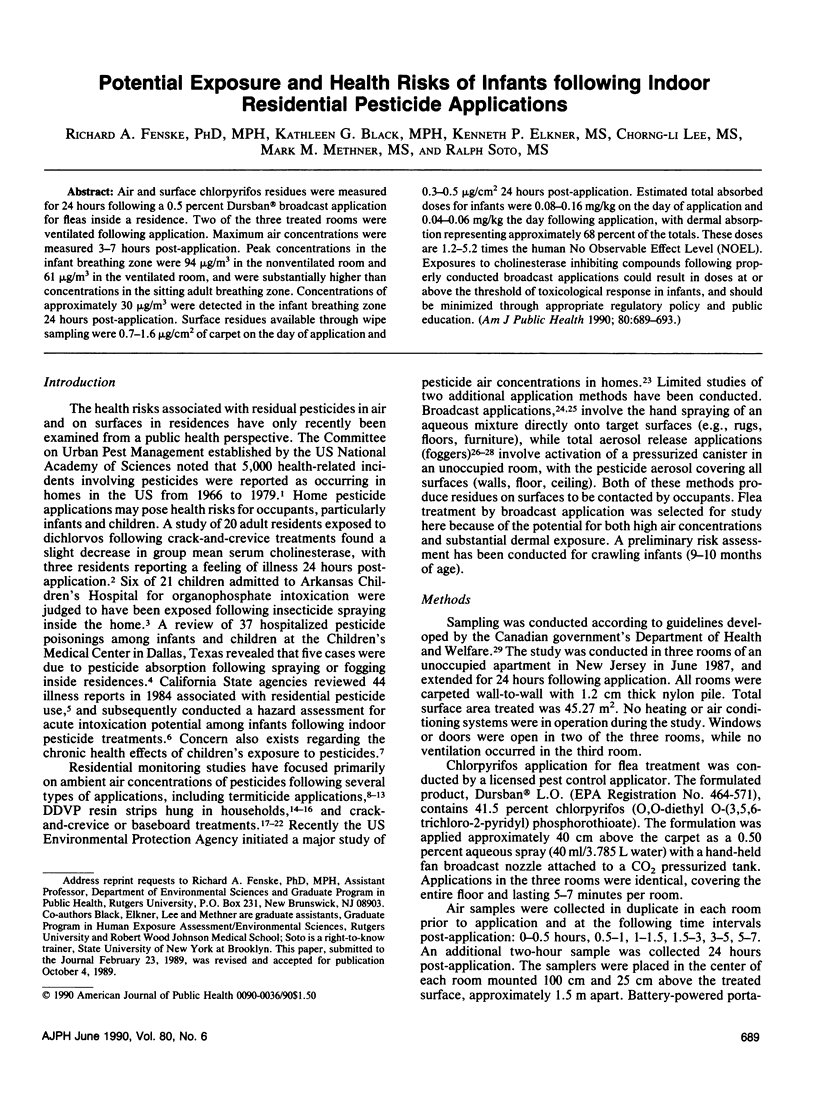
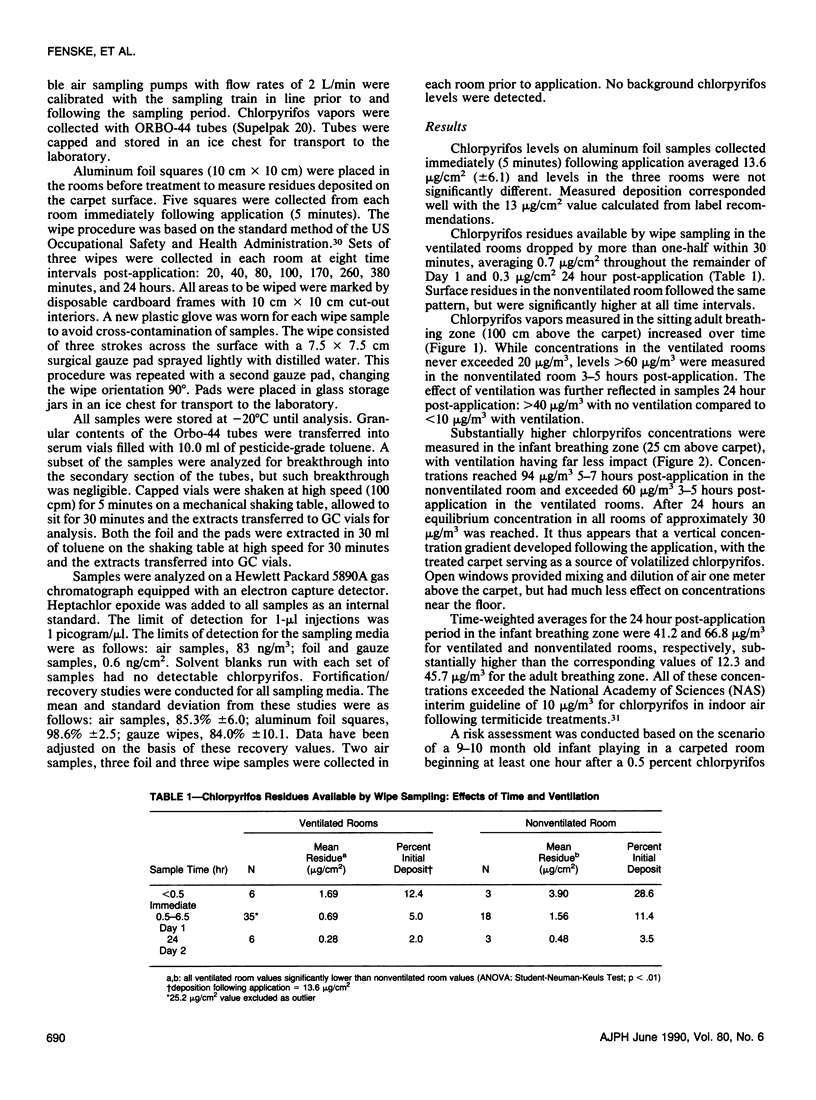
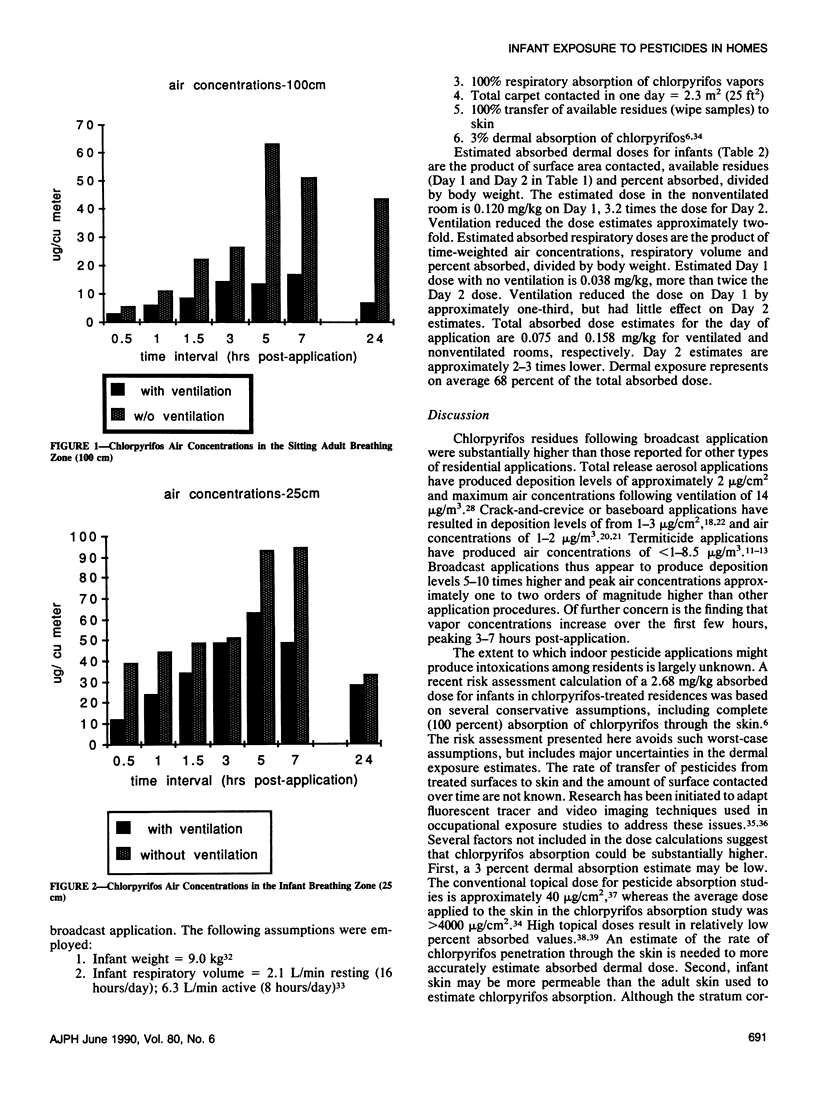
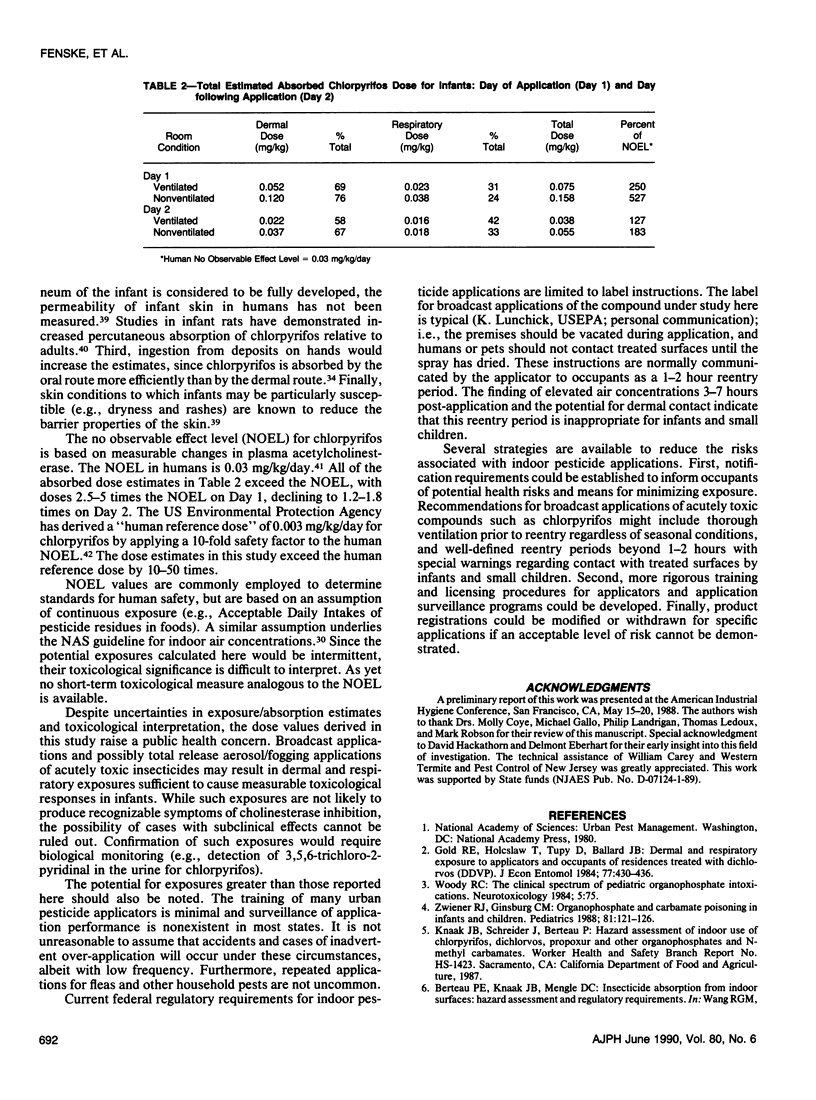
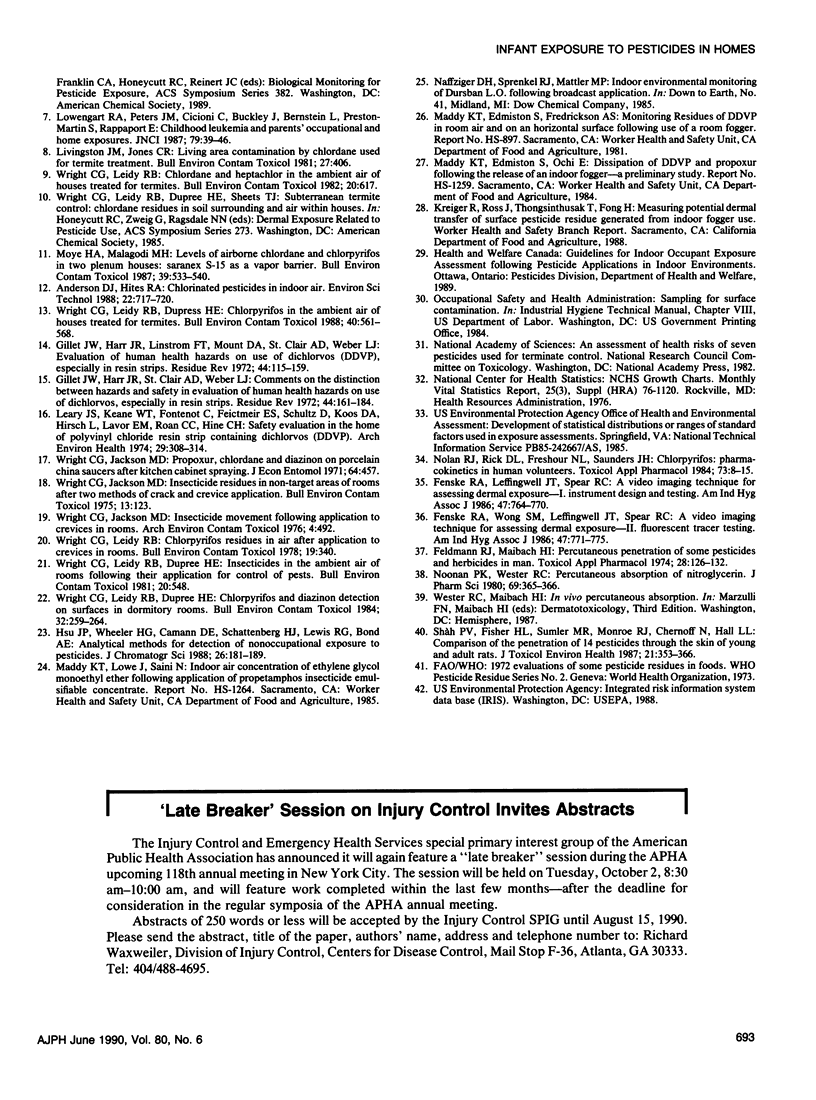
Selected References
These references are in PubMed. This may not be the complete list of references from this article.
- Feldmann R. J., Maibach H. I. Percutaneous penetration of some pesticides and herbicides in man. Toxicol Appl Pharmacol. 1974 Apr;28(1):126–132. doi: 10.1016/0041-008x(74)90137-9. [DOI] [PubMed] [Google Scholar]
- Fenske R. A., Leffingwell J. T., Spear R. C. A video imaging technique for assessing dermal exposure. I. Instrument design and testing. Am Ind Hyg Assoc J. 1986 Dec;47(12):764–770. doi: 10.1080/15298668691390629. [DOI] [PubMed] [Google Scholar]
- Fenske R. A., Wong S. M., Leffingwell J. T., Spear R. C. A video imaging technique for assessing dermal exposure. II. Fluorescent tracer testing. Am Ind Hyg Assoc J. 1986 Dec;47(12):771–775. doi: 10.1080/15298668691390638. [DOI] [PubMed] [Google Scholar]
- Gillett J. W., Harr J. R., Lindstrom F. T., Mount D. A., St Clair A. D., Weber L. J. Evaluation of human health hazards on use of dichlorvos (DDVP), especially in resin strips. Residue Rev. 1972;44:115–159. doi: 10.1007/978-1-4615-8491-9_6. [DOI] [PubMed] [Google Scholar]
- Gillett J. W., Harr J. R., St Clair A. D., Weber L. J. Comment on the distinction between hazard and safety in evaluation of human health hazards on use of dichlorvos, especially in resin strips. Residue Rev. 1972;44:161–184. doi: 10.1007/978-1-4615-8491-9_7. [DOI] [PubMed] [Google Scholar]
- Gold R. E., Holcslaw T., Tupy D., Ballard J. B. Dermal and respiratory exposure to applicators and occupants of residences treated with dichlorvos (DDVP). J Econ Entomol. 1984 Apr;77(2):430–436. doi: 10.1093/jee/77.2.430. [DOI] [PubMed] [Google Scholar]
- Hsu J. P., Wheeler H. G., Jr, Camann D. E., Schattenberg H. J., 3rd, Lewis R. G., Bond A. E. Analytical methods for detection of nonoccupational exposure to pesticides. J Chromatogr Sci. 1988 Apr;26(4):181–189. doi: 10.1093/chromsci/26.4.181. [DOI] [PubMed] [Google Scholar]
- Leary J. S., Keane W. T., Fontenot C., Feichtmeir E. F., Schultz D., Koos B. A., Hirsch L., Lavor E. M., Roan C. C., Hine C. H. Safety evaluation in the home of polyvinyl chloride resin strip containing dichlorvos (DDVP). Arch Environ Health. 1974 Dec;29(6):308–314. doi: 10.1080/00039896.1974.10666604. [DOI] [PubMed] [Google Scholar]
- Livingston J. M., Jones C. R. Living area contamination by chlordane used for termite treatment. Bull Environ Contam Toxicol. 1981 Sep;27(3):406–411. doi: 10.1007/BF01611040. [DOI] [PubMed] [Google Scholar]
- Lowengart R. A., Peters J. M., Cicioni C., Buckley J., Bernstein L., Preston-Martin S., Rappaport E. Childhood leukemia and parents' occupational and home exposures. J Natl Cancer Inst. 1987 Jul;79(1):39–46. [PubMed] [Google Scholar]
- Moye H. A., Malagodi M. H. Levels of airborne chlordane and chlorpyrifos in two plenum houses: Saranex S-15 as a vapor barrier. Bull Environ Contam Toxicol. 1987 Sep;39(3):533–540. doi: 10.1007/BF01688321. [DOI] [PubMed] [Google Scholar]
- Nolan R. J., Rick D. L., Freshour N. L., Saunders J. H. Chlorpyrifos: pharmacokinetics in human volunteers. Toxicol Appl Pharmacol. 1984 Mar 30;73(1):8–15. doi: 10.1016/0041-008x(84)90046-2. [DOI] [PubMed] [Google Scholar]
- Noonan P. K., Wester R. C. Percutaneous absorption of nitroglycerin. J Pharm Sci. 1980 Mar;69(3):365–366. doi: 10.1002/jps.2600690337. [DOI] [PubMed] [Google Scholar]
- Shah P. V., Fisher H. L., Sumler M. R., Monroe R. J., Chernoff N., Hall L. L. Comparison of the penetration of 14 pesticides through the skin of young and adult rats. J Toxicol Environ Health. 1987;21(3):353–366. doi: 10.1080/15287398709531024. [DOI] [PubMed] [Google Scholar]
- Wright C. G., Jackson M. D. Insecticide movement following application to crevices in rooms. Arch Environ Contam Toxicol. 1976;4(4):492–500. doi: 10.1007/BF02221045. [DOI] [PubMed] [Google Scholar]
- Wright C. G., Jackson M. D. Insecticide residues in non-target areas of rooms after two methods of crack and crevice application. Bull Environ Contam Toxicol. 1975 Jan;13(1):123–128. doi: 10.1007/BF01684875. [DOI] [PubMed] [Google Scholar]
- Wright C. G., Leidy R. B. Chlordane and heptachlor in the ambient air of houses treated for termites. Bull Environ Contam Toxicol. 1982 May;28(5):617–623. doi: 10.1007/BF01605594. [DOI] [PubMed] [Google Scholar]
- Wright C. G., Leidy R. B. Chlorpyrifos residues in air after application to crevices in rooms. Bull Environ Contam Toxicol. 1978 Mar;19(3):340–344. doi: 10.1007/BF01685808. [DOI] [PubMed] [Google Scholar]
- Wright C. G., Leidy R. B., Dupree H. E., Jr Chlorpyrifos and diazinon detection on surfaces in dormitory rooms. Bull Environ Contam Toxicol. 1984 Mar;32(3):259–264. doi: 10.1007/BF01607495. [DOI] [PubMed] [Google Scholar]
- Wright C. G., Leidy R. B., Dupree H. E., Jr Chlorpyrifos in the ambient air of houses treated for termites. Bull Environ Contam Toxicol. 1988 Apr;40(4):561–568. doi: 10.1007/BF01688381. [DOI] [PubMed] [Google Scholar]
- Wright C. G., Leidy R. B., Dupree H. E., Jr Insecticides in the ambient air of rooms following their application for control pests. Bull Environ Contam Toxicol. 1981 Apr;26(4):548–553. doi: 10.1007/BF01622135. [DOI] [PubMed] [Google Scholar]
- Zwiener R. J., Ginsburg C. M. Organophosphate and carbamate poisoning in infants and children. Pediatrics. 1988 Jan;81(1):121–126. [PubMed] [Google Scholar]


